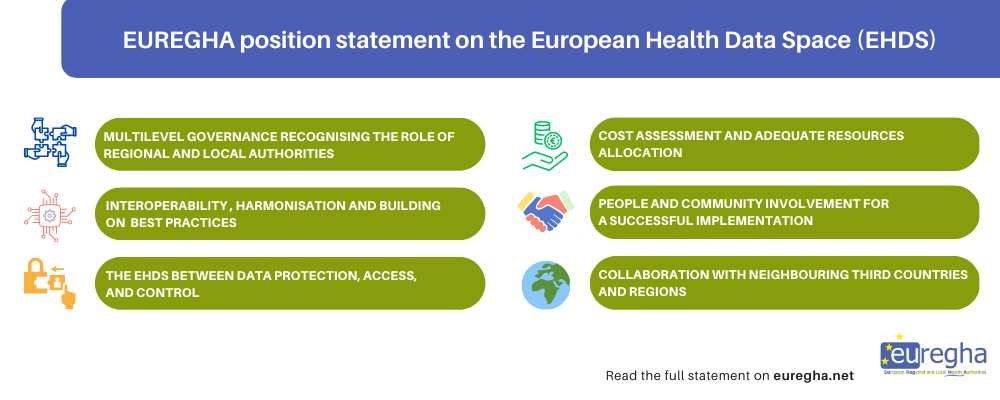
EUREGHA – European Regional and Local Health Authorities supports the European Commission’s proposal for a Regulation on the European Health Data Space (EHDS), which aims to facilitate sharing and access to health data across the Union for primary and secondary uses, while also ensuring citizens’ control over their own health data. EUREGHA agrees that this initiative is pivotal to strengthening health systems in the context of their rapid digital transformation, defining a future-proof framework to harness the potential of health data. In the EU, 19 out of 27 Member States’ health systems are decentralised, with regions and local health authorities overseeing healthcare organisation and delivery and thus driving digital transformation of healthcare. Considering the expertise of regional and local health authorities, their specific needs and their numerous initiatives ongoing in the field of health data, EUREGHA crafted a position statement, focused on emphasizing the regional and local health authorities’ role in making the EHDS a reality.
Our key messages from the position statement:
- Recognizing the important role of regional and local health authorities in a context of multilevel governance will be essential for the implementation of the EHDS, including to allocate adequate resources and take into account existing practices. The Regulation should also ensure that the EHDS Board will actively engage with regions and local authorities’, in the framework of a broader stronger stakeholders’ inclusion.
- The EHDS success will heavily rely on successfully tackling technical interoperability issues, defining clear common standards, improving harmonisation of existing and upcoming key EU legislative frameworks.
- The EHDS implementation should build on best practices and initiatives developed and implemented at regional and local levels, to avoid duplication and efficiently use existing resources.
- The EHDS should thus be built on privacy and security by design, an essential step to ensure trust. Crucial elements of discussion are individuals’ access and control of their data, and consent options and procedures. It is important to find a correct equilibrium between protecting citizens’ privacy on one hand, as well as giving them the adequate tools that will allow them to participate in their care and providing quality healthcare on the other hand, thus enabling the attainment of the ambitious EHDS objectives.
- Ensuring data quality will be paramount for the success of the EHDS. It will be important to ensure adequate attention concerning efficient data quality checks to limit the negative impact of potentially faulty or incorrectly amended data usage.
- Costs assessment in the Regulation does not adequately consider the wide range of expenses that regional and local administrations will have to face, including indirect costs. EUREGHA strongly believes that increased funding, as well as synergies with already existing funds and projects, are essential to ensure proper implementation. Moreover, given the disparities across and within Member States, it will be necessary to carefully assess the existing levels of digital and health data preparedness.
- The role of regional and local health authorities will not only be limited to ‘technical implementation’, but also include the ‘social implementation’ of the EHDS, to understand and address the needs of their communities and ecosystems, including individuals, workforce and other stakeholders.
- Ensuring that vulnerable groups or groups with less digital preparedness are not neglected will be key, for instance through targeted digital health literacy development, providing digital knowledge, but also sustaining people during this process. Equal attention should be granted to the development of digital skills for the health workforce.
- Trust building will be key, and achievable through both providing individuals with tools to consult and engage with their own health data and participate in their care, and showcasing to individuals the great impact that the use of health data can have on research, innovation and policy-making.
- EUREGHA highlights the importance for regional and local health authorities outside of the EU to engage with the EHDS, for instance to ensure that research and data exchange between neighbouring regions will not be negatively affected or to avoid disruption of existing collaboration and projects with EU neighbouring regions.
Check out the full statement by clicking on the button below.


